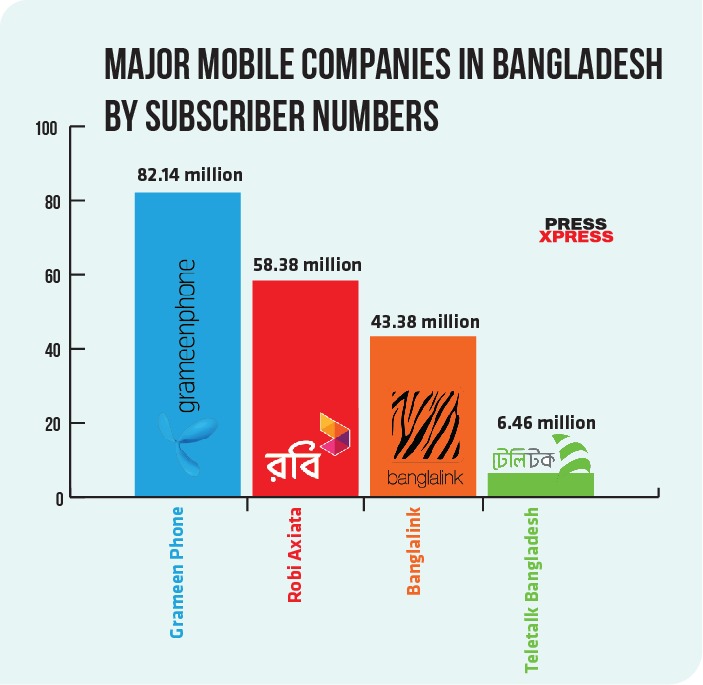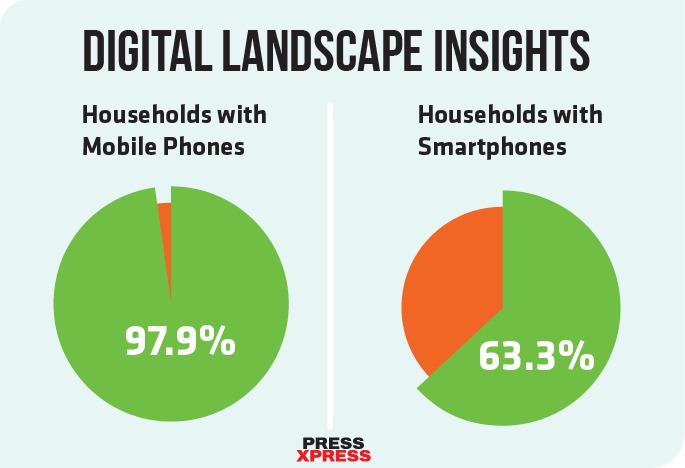Bangladesh Telecommunication Regulatory Commission (BTRC) recently revealed a groundbreaking surge in mobile phone users in the country. As of November 2023, the tally of mobile phone users in the nation has surged past an extraordinary milestone, reaching a record-breaking 190 million. This significant accomplishment represents a remarkable ascent from just a year prior when the subscriber count stood at 180.20 million.
Upon a closer examination of the data meticulously furnished by the BTRC, the precise count of mobile subscribers in this South Asian enclave stood at an impressive 190.36 million in November 2023. This not only highlights the numerical magnitude of the achievement but signifies a transformative shift in the nation’s digital landscape.
Leading Operators
Notably, Bangladesh currently houses four major mobile companies, with three of them enjoying the backing of foreign entities, further attesting to the global intrigue and investment in the country’s flourishing mobile industry.
Breaking down the subscriber base, Grameen Phone, Robi Axiata, Banglalink Digital Communications, and Teletalk Bangladesh command impressive figures of 82.14 million, 58.38 million, 43.38 million, and 6.46 million, respectively.

In June of this year, it was found that Bangladesh had exceeded 180 million mobile phone users and 130 million internet users. Finance Minister AHM Mustafa Kamal, during the presentation of the national budget for the fiscal year 2023-24, declared, “Currently, the number of mobile SIM users and internet users are more than 180 million and 130 million respectively.” The government’s Digital Bangladesh initiative, centered on connectivity, skilled human resources, e-government, and ICT industry promotion, has witnessed unprecedented progress, with the finance minister noting a significant reduction in internet bandwidth costs under governmental efforts.
Fast forward to July, and the revelation that 97.9% of households in Bangladesh own mobile phones, while 63.3% possess smartphones, adds another layer to the digital landscape. A ceremony unveiling the final report on the “ICT Use Survey” at the Bangladesh Bureau of Statistics (BBS) auditorium shared these insights. Planning Minister MA Mannan, as the chief guest, emphasized the survey’s findings, indicating a decline in computer use due to the increasing dominance of smartphones. He stressed the importance of such data for policymakers in formulating effective strategies.
Project Director Syeda Marufa Shaki, presenting the survey findings, disclosed that data collection spanned from May 29, 2022, to August 28, 2022, involving 30,816 sample households. Regional breakdowns showcased Chittagong Division leading with 78.5% of households using smartphones. In terms of internet access, Dhaka Division took the lead with 59%, emphasizing the urban-rural digital divide. Furthermore, insights into the locations of internet usage highlighted the prevalence of home usage at 76.4%.

Concerns loom for Privacy and Security
Among these all mobile phone users, a remarkable 97 percent of mobile internet users in Bangladesh harbor concerns about the privacy and security of their data, according to a report by global telecom company Telenor. Unveiled under the title “Telenor Asia Digital Lives Decoded,” this report stems from an exhaustive study involving over 8,000 participants across eight Asian countries, including Bangladesh, Indonesia, Malaysia, Pakistan, the Philippines, Singapore, Thailand, and Vietnam.
This comprehensive study is not merely a statistical analysis but an attempt to decode the intricate behaviors and attitudes prevalent in the realm of mobile connectivity. It delves into the transformative impact of mobile technology, unraveling how it is reshaping the very fabric of life, work, and play for individuals across Asia.
Within this tapestry of findings, Bangladesh emerges as a nation deeply invested in staying abreast of evolving technology, with approximately 97 percent expressing concerns about the adequacy of their digital skills for the future. Moreover, Bangladeshis, at about 57 percent, stand out among their regional counterparts as notably optimistic about the new income streams facilitated by smartphones.
The study goes beyond quantitative metrics, exploring the qualitative aspects of individuals’ lives touched by mobile connectivity. An overwhelming 91 percent of respondents in Bangladesh attribute an improvement in their quality of life to mobile usage. Strikingly, around 73 percent anticipate an increased reliance on smartphones in the next 12 to 24 months.
Women Lead in Embracing Mobile Advancements
The gendered impact of mobile phones on quality of life is also underscored, with more women (about 59 percent) than men (about 50 percent) acknowledging significant improvements. Women, at 51 percent, particularly highlight enhanced access to services and apps in healthcare, finance, and education as contributors to a better quality of life, compared to around 37 percent of men.
Delving into environmental consciousness, a substantial 74 percent of Bangladeshi respondents emphasize the importance of digital access for leading greener lives, reducing paper and waste, and enhancing communication efficiency.
However, the report doesn’t shy away from acknowledging challenges. Approximately 48 percent of Bangladeshis admit to utilizing technology productively, while 73 percent believe their companies miss out on revenue opportunities due to underdeveloped usage of mobile technology. Barriers identified include privacy and security concerns (61 percent), lack of skills and knowledge (60 percent), and a lack of trust in technology (49 percent).
Importance of mobile phones in accessing government emergency services
Promoting mobile phone integration for SMART Cities and Villages in Bangladesh, the Civil Service 2041 project has been initiated to streamline government services. The government of Bangladesh employs digital technologies to offer various services, establishing an ecosystem that engages citizens in accessing these services through mobile phones. Services encompass national helplines such as 999, 333, 16122, 16263, and more, covering emergencies, healthcare, land-related matters, and others. The increasing popularity of these helplines reflects a positive impact on public welfare, with the national emergency helpline being a significant stride towards modernization, potentially saving lives in distress.


